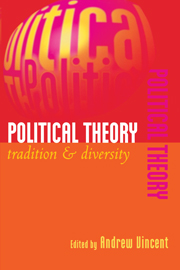Book contents
- Frontmatter
- Contents
- Preface
- List of Contributors
- Introduction
- 1 Political Theory and Conceptual Change
- 2 Political Theory and the Problem of Anachronism
- 3 Utilitarianism as a Public Philosophy
- 4 Rational Choice Political Theory
- 5 Republican Political Theory
- 6 Liberalism, Multiculturalism and Oppression
- 7 Postcolonialism and Political Theory
- 8 Legal Positivism and Political Power
- 9 Political Theory, International Theory, and the Political Theory of International Relations
- 10 Method Matters: Feminism, Interpretation and Politics
- 11 The Political Philosophy of Deleuze and Guattari
- 12 The Object of Political Theory
- Index
7 - Postcolonialism and Political Theory
Published online by Cambridge University Press: 29 March 2011
- Frontmatter
- Contents
- Preface
- List of Contributors
- Introduction
- 1 Political Theory and Conceptual Change
- 2 Political Theory and the Problem of Anachronism
- 3 Utilitarianism as a Public Philosophy
- 4 Rational Choice Political Theory
- 5 Republican Political Theory
- 6 Liberalism, Multiculturalism and Oppression
- 7 Postcolonialism and Political Theory
- 8 Legal Positivism and Political Power
- 9 Political Theory, International Theory, and the Political Theory of International Relations
- 10 Method Matters: Feminism, Interpretation and Politics
- 11 The Political Philosophy of Deleuze and Guattari
- 12 The Object of Political Theory
- Index
Summary
What does contemporary political theory have to learn from the recent outpouring of postcolonial writing? What aspects of the normative apparatus of contemporary liberal political theory, for example, are brought into focus and into question by postcolonial concerns and approaches? Despite the sometimes wilful obscurantism of postcolonial theorists, and a tendency to reduce complex arguments and traditions in political theory to easy slogans, I want to claim that there are enormously important and relevant issues at play in their work that deserve careful attention. They speak to some of the most pressing and distressing issues of our day. Namely, they are relevant to an understanding of the ‘politics of recognition’; the ‘bewildering landscape’ of demands for cultural recognition in late-modern political societies everywhere – north, south, east and west (Tully 1995: 2; Taylor et al. 1992; Young 1990; Kymlicka 1995). The demand for recognition is linked to questions of identity, whether on the part of an individual or a group. Identity is partially shaped, as well as misshaped, by recognition (or its absence) by others. The specific differences that are recognized (or not), and the particular ways in which they are, have very real consequences – political, economic and cultural – for the parties involved. Postcolonial theory, in part, attempts to map and make sense of the interdependencies and asymmetries between these differences and identities.
- Type
- Chapter
- Information
- Political TheoryTradition and Diversity, pp. 154 - 171Publisher: Cambridge University PressPrint publication year: 1997
- 4
- Cited by

